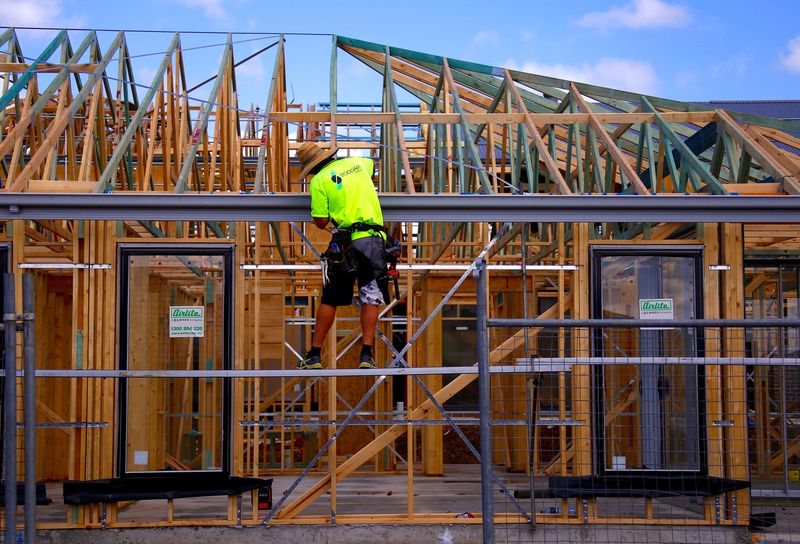By Devayani Sathyan
BENGALURU (Reuters) - The Reserve Bank of Australia will keep its key interest rate unchanged at 4.35% on Tuesday and a rate cut is now not expected to happen until the fourth quarter of next year due to a strong housing market, according to a Reuters poll.
Even with rates at a 12-year high, Australian home prices have recovered all of their 2022 losses since finding a floor in January. They are expected to rise 8% this year and another 5% next year, a separate Reuters poll showed.
"We expect there will be no change from the RBA next week, but we do think they will maintain a hawkish bias. So they're going to talk up the prospect of rate hikes, but ultimately we don't think they're going to deliver," said Ben Picton, senior strategist at Rabobank.
The interest rate poll, conducted Nov. 29-Dec. 1, showed 28 of 30 economists, including those at Australia's big four banks, expect the central bank will keep its official cash rate on hold on Dec. 5.
Although consumer price inflation in October logged a slower annual pace of 4.9% growth compared with 5.6% in September, that was still well above the RBA's 2-3% target range.
Two economists, however, predicted a 25 basis point hike.
Looking further ahead, 20 of 29 economists predicted the RBA will hold rates steady until end-March while the rest forecast a quarter percentage point hike by then.
Poll medians showed rates on hold until end-September followed by a 25 basis points cut to 4.10% in the last quarter of 2024, one quarter later than predicted in a November survey and putting the RBA behind many of its peers.
The Australian housing market, already one of the most expensive in the world, is expected to maintain steady growth as increasing demand outstrips supply.
Expectations for average home prices in Australia this year have been revised up consistently - from a 9.1% fall in Reuters' February poll to an 8.0% rise in the December poll, underscoring the market's resilience in spite of higher interest rates.
"Multiple consecutive interest rate rises earlier in the year were expected to considerably impact Australia's current mortgage holders. However, distressed sales were relatively minimised due to increasing cash buyers propping up the residential market and the Australian economy continuing to hold full employment," wrote Michelle Ciesielski at Knight Frank, who took part in the Nov. 16- Dec .1 survey of 11 property analysts.
"Compared to the significantly higher migration, the current limited number of new homes being built or being started by developers points to inevitably higher house prices being achieved in 2024."
The poll, which asked about the outlook for home prices in Sydney, Melbourne, Brisbane, Adelaide, and Perth, showed expectations ranging between 3.5% and 7.0% growth for both 2024 and 2025.
Asked about how the ratio of home ownership to renters will change over the coming five years, all nine analysts who responded to the question said it would decrease.
"Affordability looks terrible right now because home prices are back to their record highs and interest rates are at their multi-year highs, which means you're kind of getting hit from both sides," said Diana Mousina, deputy chief economist at AMP (OTC:AMLTF).

"Affordability could improve if prices fall a little bit and it will also improve marginally if the RBA cuts interest rates. But it's not going to improve dramatically unless you see a very big fall in prices by 30%, if not more."
(Other stories from the Reuters quarterly housing market polls)